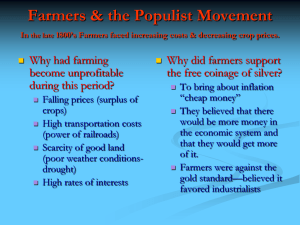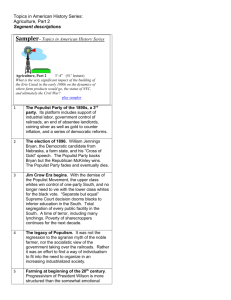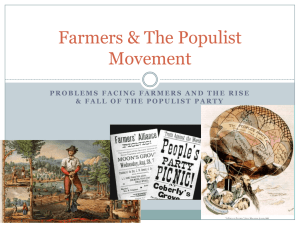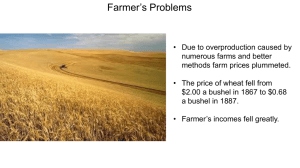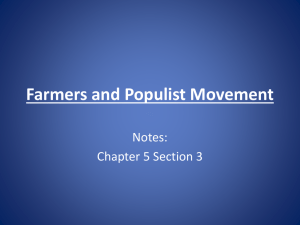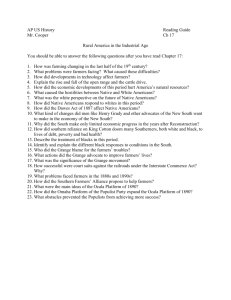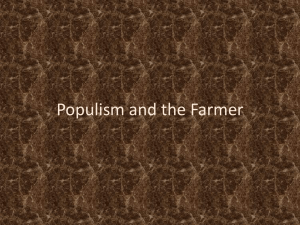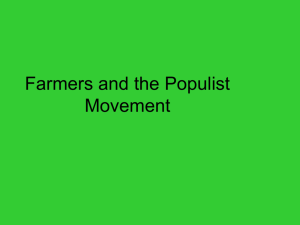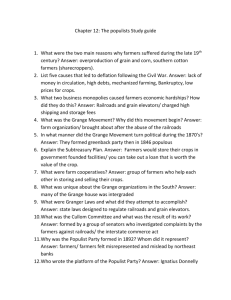Introduction to Progressive Era
advertisement
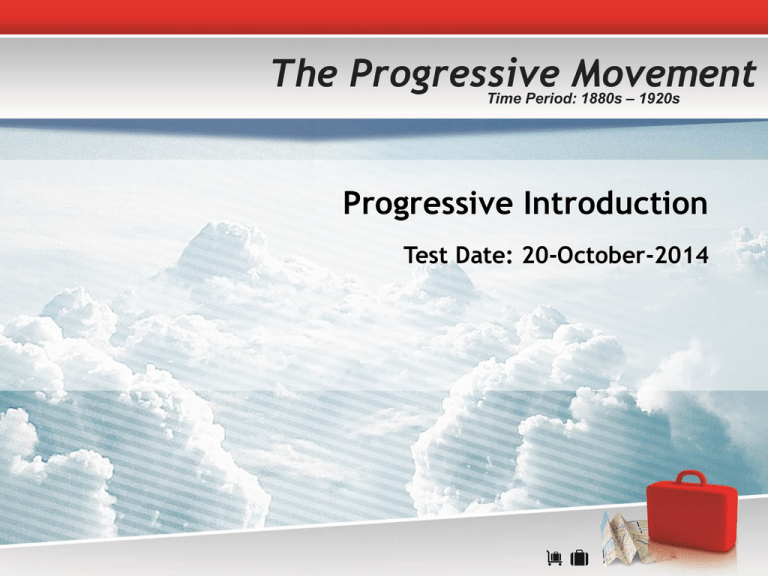
The Progressive Movement Time Period: 1880s – 1920s Progressive Introduction Test Date: 20-October-2014 Homework Questions – Due Thursday, 16-Oct-2014 Each answer must: • Be a minimum of 1 page. • Answered in complete sentences 1. How did farmers respond to the problems they faced in the late nineteenth century? 2. How did muckrakers and other Progressives reform American society? 3. How was the move toward realism reflected in American art and literature? Notecard Spirals are DUE!!! THIS FRIDAY!!! 10-OCTOBER-2014 Must: • • • • • Be Numbered Be Colored with at LEAST 3 colors Have the Vocabulary Word Have the correct definition in your own words Be Stamped PRIOR to the due date NO EXCUSES… GET IT DONE. A 0 FOR A TEST GRADE WILL KILL YOUR CHANCE AT PASSING Overview Overview / Key People Reformers You will learn how Americans adopted important reforms to meet the new problems posed by industrialization and urbanization. Progressive reformers sought to remedy the social problems caused by industrialization. The Progressive Presidents introduced Progressive reforms at the national level. http://youtu.be/z-ztBdclkYU Key People Key People Key People Key People Key People William Jennings Bryan Lincoln Steffens President Garfield Horatio Alger Thomas Eakins William McKinley Frank Norris Theodore Roosevelt Mark Twain Jack London Muckrakers Jane Addams William Taft William Dean Howells Henry James Ida Tarbell Ida B. Wells Woodrow Wilson Henry Ossawa Tanner Katie Chopin Jacob Riis W.E.B. DuBois Susan B. Anthony Frederick Remington Winslow Homer Upton Sinclair Booker T. Washington Elizabeth Cady Stanton James McNeill Whistler Charles Russell The Agrarian Movement Grange / Populist Farmer Problems • Today, less than 2% of Americans live on farms! • 1870s: a majority of Americans live on farms. • Farmer Problems : • Agricultural Overproduction: Opening of the west greatly increased the amount of land cultivated. Machinery & improved farming techniques increased productivity per acre. As farmers produced more crops, food prices fell GREATLY! • High Costs: Farmers had to ship their crops to market. Railroads often took advantage of the lack of competition on local routes by charging higher rates for shorter distances. • Farmer Indebtedness: They borrowed to make improvements or to by machinery. During a poor harvest, farmers also borrowed, using their farms as security. Banks viewed farmers as poor credit risks and charged them VERY high interest rates. • Periodic Natural Disasters: Farms were subject to droughts, insect invasions, and floods. One bad year to their crops could wipe out a family’s savings from many good years. The Agrarian Movement Grange / Populist The Grange Movement • Think Home on the Range… Just add a G! • Founded in 1867 as a social club for farmers to help them overcome isolation and to spread information about new techniques. • By 1877, the Grangers had 1.5 MILLION members and began urging economic and political reforms. • Granger Cooperatives: To eliminate the middleman. Can buy and sell in large numbers for discounts. • Buy Machinery, Fertilizers, Manufactured Goods • Sold Crops Directly to City Markets • Failed because of lack of business experience • The Granger Laws: Famers blamed the railroads for their problems. • In several Midwestern States, Grangers elected candidates to state legislatures who promised reforms. These states passed laws regulating railroad and grain storage. • Munn v. Illinois: 1877 : The Supreme Court upheld the right of a state to regulate businesses that affected the public interest within the state. However, in 1886, the Supreme Court reversed itself in a case involving the state regulation of railroad rates. The Court ruled that only Congress could regulate rates on interstate commerce (Interstate Commerce Act). The Agrarian Movement Grange / Populist The Populist Party : 1891 - 1896 • 1892: Farmers gave their support to the Populist Party • A new national political party representing the “common man”- Farmers, Industrial Workers, Miners- in a battle against banking and railroad interests. • Women played a prominent role in the Populist Movement as speakers and organizers. • Convinced that rich industrialists and bankers had a stranglehold on government • Wanted government to take a larger role • National Convention in Omaha, Nebraska to choose a Presidential Candidate. • Party Platform (had several innovative proposals) • • • • • • • • Unlimited Coinage of Silver: To raise farm prices & make loan repayment easier Direct Election of Senators: Instead of by state legislatures Term Limits for President: Permitting only a single term in office Secret Ballot: To protect voters from intimidation Government Ownership: of railroads, telegraphs, and telephones Graduated Income Tax: To tax Wealthy individuals at a higher rate Immigration Restrictions: With Quotas Shorter Work Day: Of 8 hours
